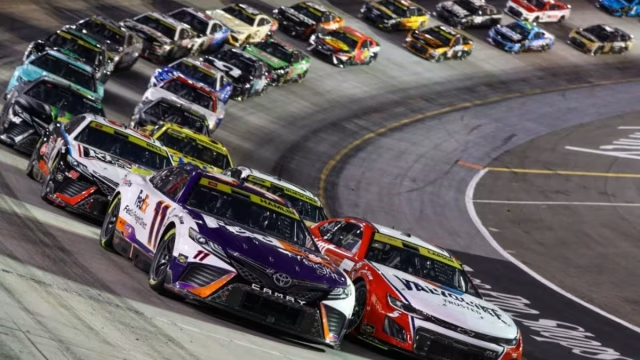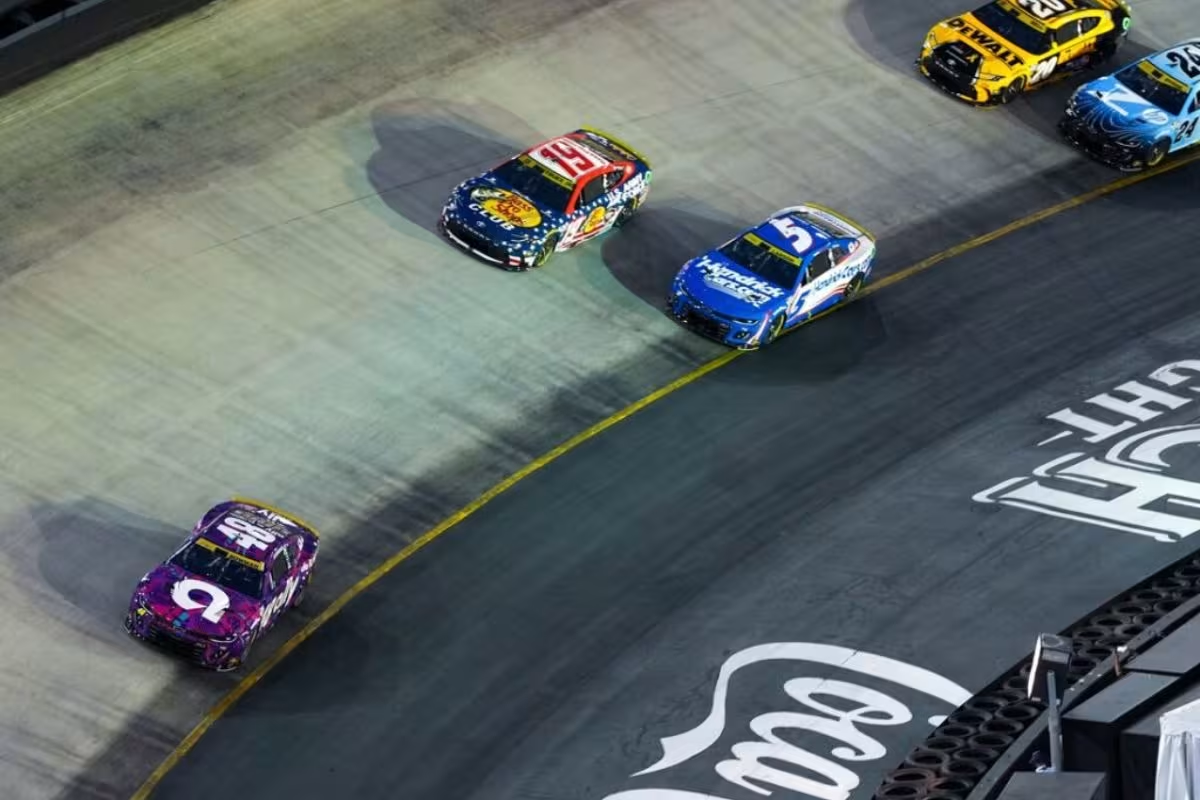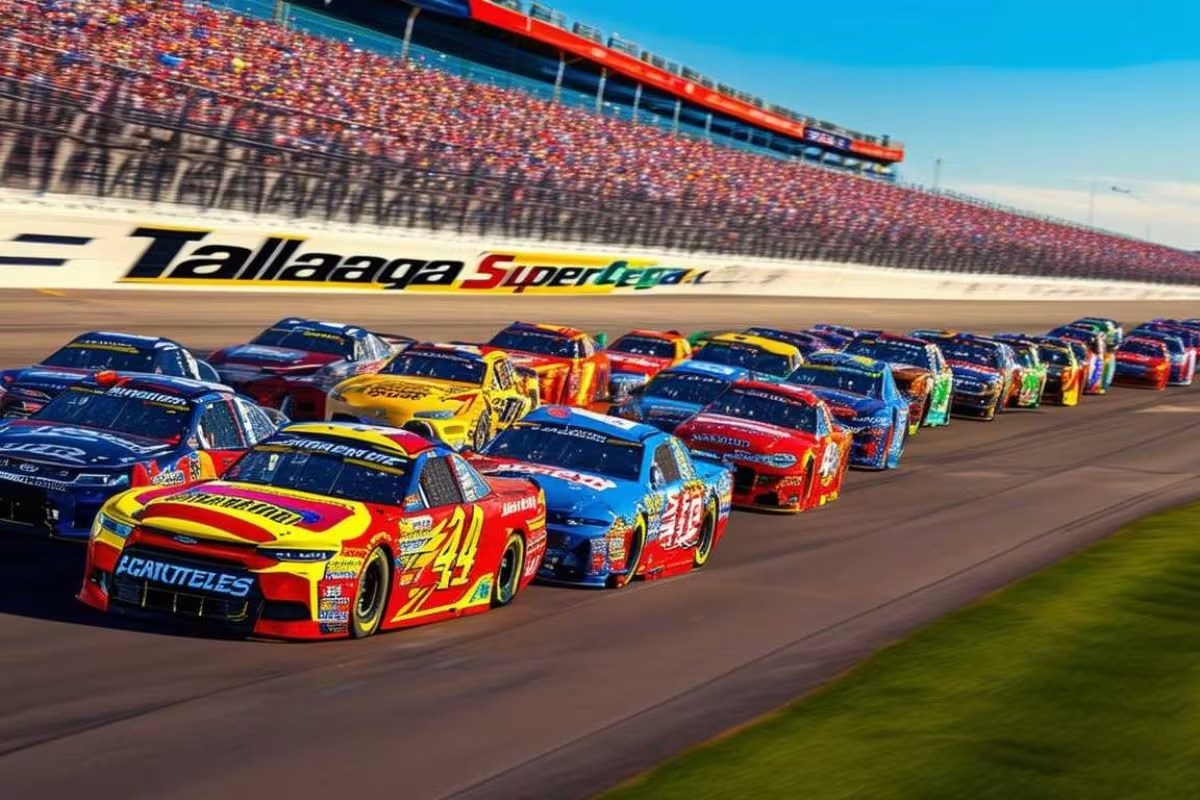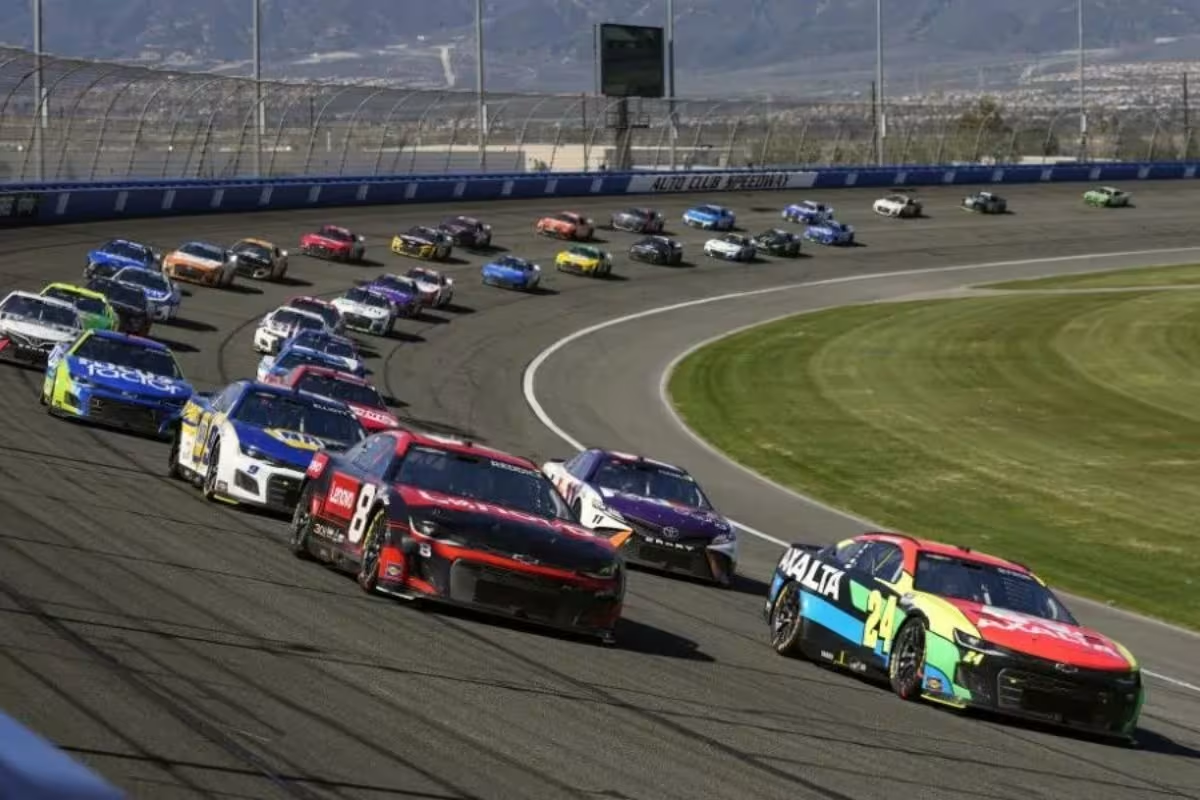Bristol Night Race Controversy: The recent Bristol Night Race, marked by Kyle Larson‘s commanding lead, has ignited a considerable discourse among NASCAR enthusiasts about the essence of excitement in racing. While Larson’s ability to dominate, leading 462 laps, exemplifies his expertise, it simultaneously raises critical questions regarding the balance between skill and the unpredictability that fans crave. With a mere 27.2% of spectators expressing enjoyment, the implications of such dominance on the sport’s appeal warrant careful examination. What does this indicate about the future of competitive racing, and how might it reshape viewer expectations?
Key Highlights
- Kyle Larson’s overwhelming win at the Bristol Night Race led to only 27.2% of fans expressing enjoyment, indicating a lack of excitement.
- Fans prefer competitive races with potential upsets, which Larson’s dominance overshadowed, diminishing viewer engagement.
- Social media discussions reveal a divide in fan sentiment, with many arguing dominant performances reduce overall excitement in racing.
- Critics of Larson’s reaction to poll results emphasize the importance of race excitement over individual driver achievements.
- Nostalgia for “old school” racing influences fan perceptions, contrasting modern dominance with past competition.
Debate on Bristol Night Race Enjoyment
Some fans argue that the excitement of a race can be greatly diminished by one driver’s overwhelming performance, as was the case during the recent Bristol Night Race. Kyle Larson‘s commanding dominance, leading 462 out of 500 laps, has sparked a notable debate regarding the general enjoyment of the event. While Larson’s victory exemplified unmatched skill and strategy within the Next Gen era of NASCAR, it raised questions about competitive balance and viewer engagement.
The crux of the dissatisfaction lies in the predictability of the race outcome. A driver who laps competitors not only signals a lack of rivalry but also diminishes the competitive spirit that draws fans to the sport. The essence of racing lies in the drama of the chase, the potential for upsets, and the thrill of uncertainty; Larson’s performance, while commendable, stripped away these elements.
Jeff Gluck’s subsequent poll, which reflected a considerable disapproval among fans, further highlights this sentiment. Many viewers felt that Larson’s dominance rendered the event less thrilling, as the anticipated excitement of head-to-head battles was noticeably absent. This reaction demonstrates a broader concern within NASCAR regarding the impact of individual performance on fan engagement.
As the debate continues, it becomes evident that while dominant performances can exhibit a driver’s skill, they may also jeopardize the very excitement that captivates audiences. The challenge for NASCAR lies in fostering competitive parity, ensuring that each race remains a contest filled with uncertainty and drama, enriching the viewing experience for all fans.
Poll Results and Fan Reactions
The recent poll results concerning the Bristol Night Race have sparked considerable discourse among NASCAR fans, reflecting a growing dissatisfaction with the predictability of dominant performances. Only 27.2% of participants in Jeff Gluck’s poll expressed enjoyment of the race, a clear contrast to other events where competitiveness and unpredictability heightened viewer engagement, such as at Watkins Glen.
Kyle Larson’s commanding victory, where he led 450 laps, has been perceived not as a demonstration of skill but rather as a detriment to the race’s excitement. Fans’ reactions indicate a craving for more dynamic competition, where multiple drivers contend for victory, rather than a singularly dominant performance that leaves little room for suspense.
Lead 450 laps but have 2 overtime restarts and lose and I guarantee the percentage is flip flopped. That’s our fan base. https://t.co/mQ1OvdpDjc
— Kyle Larson (@KyleLarsonRacin) September 23, 2024
Larson’s retweet of the poll results, accompanied by his commentary on fans’ preferences for races characterized by multiple lead changes and overtime restarts, highlights a disconnect between driver success and viewer satisfaction. His assertion that a loss after leading would have flipped the poll results emphasizes a critical point about fan engagement in motorsports: excitement often stems from unpredictability rather than sheer dominance.
Social Media Buzz and Diverse Opinions
Social media has become a vibrant platform for NASCAR fans to express their diverse opinions regarding the Bristol Night Race controversy. The discourse has been particularly lively on Reddit, where discussions have centered around Kyle Larson’s commanding victory.
While many fans align with a sentiment that dominant performances can diminish the excitement of close finishes, a notable faction of Larson’s supporters staunchly defends the race’s integrity, asserting that such displays of talent are integral to the sport’s allure.
The crux of the debate hinges on the contrast of dominance and competitiveness in racing. Some fans articulated that witnessing a driver like Larson excel creates a deeper appreciation for both the challenges of racing and the thrill of narrowly contested finishes.
One fan’s reflection on Martin Truex Jr.’s historic performance at Charlotte encapsulated this perspective: “Sometimes you gotta have an a** kicking to appreciate the close finishes.” This sentiment suggests that the coexistence of dominating performances and nail-biting races enriches the complete spectator experience.
“Sometimes you gotta have an a** kicking to appreciate the close finishes. And sometimes the close finishes make you appreciate the ass kickings a bit. Like when we watch a race at Charlotte and everybody thinks it’s amazing… not long ago, MTJ had the most dominating performance ever. It makes you appreciate what it took for MTJ to do that.” – fans’ reaction
Moreover, this dialogue demonstrates the complexities of fan engagement in motorsports. It highlights how personal preferences shape perceptions of what constitutes an entertaining race.
While some celebrate Larson’s skill, others lament the lack of competition that often accompanies such victories, revealing the intricate tapestry of opinions that characterize the NASCAR community.
As social media continues to amplify these discussions, it is clear that the Bristol Night Race controversy has sparked a broader conversation about racing dynamics and fan expectations.
Critiques of Larson’s Reaction to Poll
Amid the ongoing discussion surrounding the Bristol Night Race, critiques of Kyle Larson’s reaction to the poll results reveal a divide among fans regarding the interplay between race excitement and driver performance. While Larson celebrated his victory, many fans expressed disappointment with the race’s lack of excitement, suggesting that Larson’s personal investment in the poll results was misplaced.
“I think Larson maybe took the poll a little personal? Even if one of my favorite drivers won, that was not an exciting race.”
“That’s how I took it. He weirdly got his feeling hurt over it. Don’t know why he cares.” – fans reaction
These critiques suggest a broader sentiment among fans that the excitement of the race should hold more weight than individual accolades. As Larson continues his pursuit of the championship, the challenge remains: balancing personal pride with the expectations of a fanbase that craves thrilling competition.
Different Perspectives on the Race Experience
Fan reactions to the Bristol Night Race illuminate the varied perspectives that shape the complete race experience. Central to this discussion is the role of social media polls, such as Jeff Gluck‘s, which have emerged as a barometer of fan sentiment.
One fan argued that such polls, while informative, should not be overly stressed, suggesting they serve better as a lighthearted metric rather than a definitive critique of race outcomes. This perspective highlights a notable schism within the NASCAR community, where not all fans are tuned into the same platforms or share the same experiences.
“Sometimes I think we give Gluck’s poll too much weight. It should be fun and lightly informative.” – fans’ reaction
Contrasting opinions emerged regarding Kyle Larson’s dominant performance. While some viewers expressed disappointment, perceiving Larson’s victory as stifling competition, others celebrated it as a nostalgic return to the “old school” racing ethos echoing the 1990s.
This latter sentiment emphasizes a longing for the era of clear dominance, with one fan remarking, “That was an old school a** whipping!” This contrast of perspectives suggests that the race experience is inherently subjective, shaped by individual preferences and historical context.
“I thought it was a great race solely because we haven’t seen dominance like that since the 90s! Everyone said they missed old school racing; that was an old school a** whipping!” – fans’ reaction
Ultimately, the Bristol Night Race serves as a microcosm of the broader NASCAR community, reflecting differing attitudes toward competition, nostalgia, and the importance of social media discourse.
As fans navigate these complex layers of experience, the debate surrounding Larson’s win continues to evoke passionate responses, revealing the multifaceted nature of race enjoyment in today’s sports landscape.
News in Brief: Bristol Night Race Controversy
The Bristol Night Race controversy highlights a crucial tension within NASCAR: the balance between individual dominance and spectator engagement. While Kyle Larson’s remarkable performance showcased his driving skill, the subsequent fan dissatisfaction signals a broader desire for competitive parity. This event invites a critical examination of race dynamics, emphasizing the importance of unpredictability and close competition in sustaining viewer interest. Ultimately, the implications of such dominant victories may prompt a reevaluation of what constitutes an engaging race experience.
ALSO READ: Bass Pro Shops Night Race 2024 Starting Lineup: The Battle Begins at Bristol



